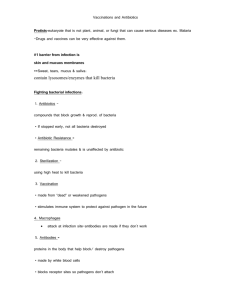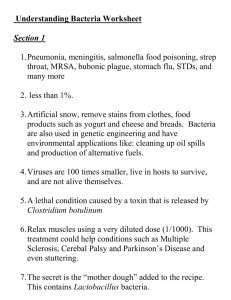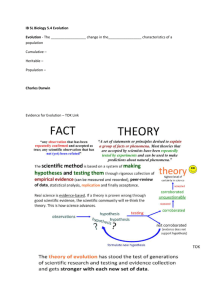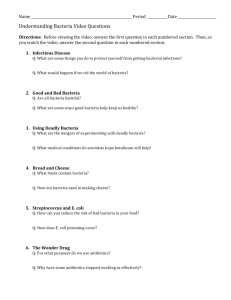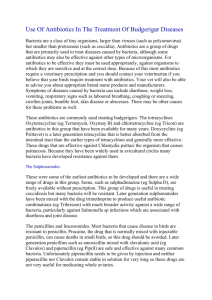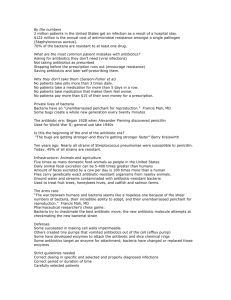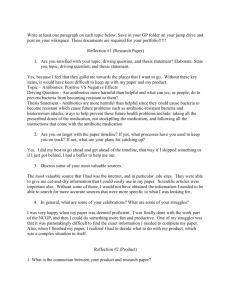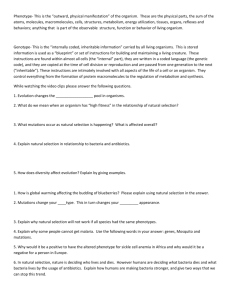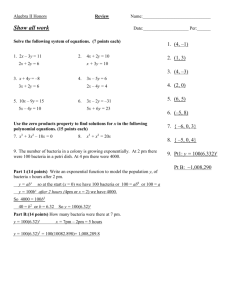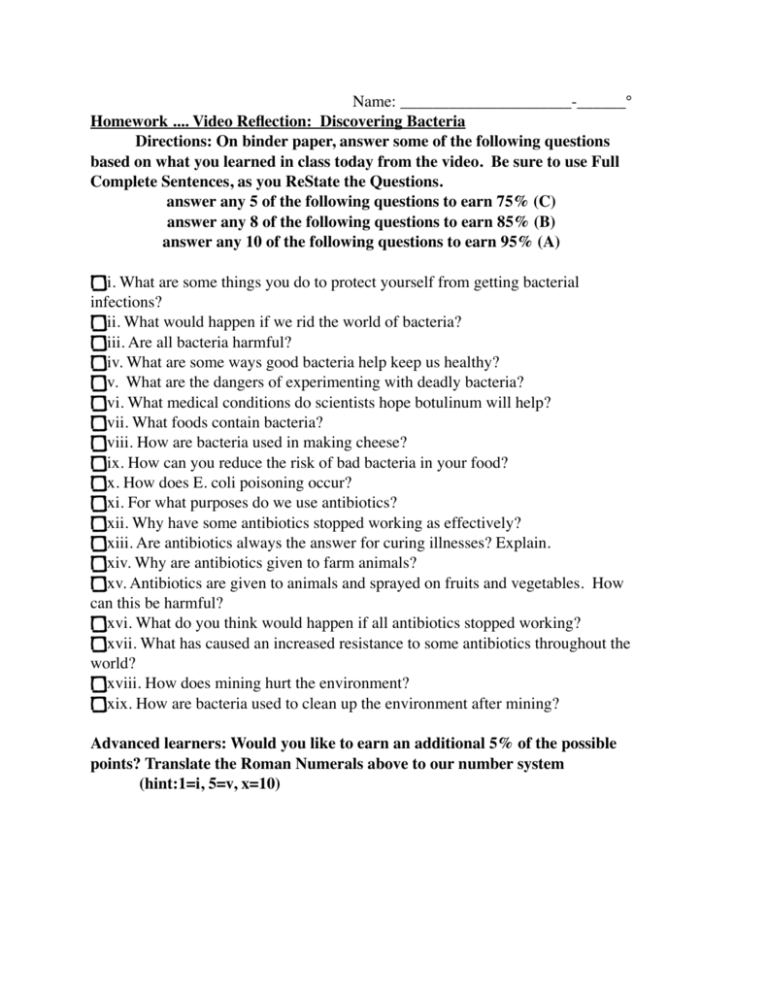
Name: _____________________-______°
Homework .... Video Reflection: Discovering Bacteria
Directions: On binder paper, answer some of the following questions
based on what you learned in class today from the video. Be sure to use Full
Complete Sentences, as you ReState the Questions.
answer any 5 of the following questions to earn 75% (C)
answer any 8 of the following questions to earn 85% (B)
answer any 10 of the following questions to earn 95% (A)
i. What are some things you do to protect yourself from getting bacterial
infections?
ii. What would happen if we rid the world of bacteria?
iii. Are all bacteria harmful?
iv. What are some ways good bacteria help keep us healthy?
v. What are the dangers of experimenting with deadly bacteria?
vi. What medical conditions do scientists hope botulinum will help?
vii. What foods contain bacteria?
viii. How are bacteria used in making cheese?
ix. How can you reduce the risk of bad bacteria in your food?
x. How does E. coli poisoning occur?
xi. For what purposes do we use antibiotics?
xii. Why have some antibiotics stopped working as effectively?
xiii. Are antibiotics always the answer for curing illnesses? Explain.
xiv. Why are antibiotics given to farm animals?
xv. Antibiotics are given to animals and sprayed on fruits and vegetables. How
can this be harmful?
xvi. What do you think would happen if all antibiotics stopped working?
xvii. What has caused an increased resistance to some antibiotics throughout the
world?
xviii. How does mining hurt the environment?
xix. How are bacteria used to clean up the environment after mining?
Advanced learners: Would you like to earn an additional 5% of the possible
points? Translate the Roman Numerals above to our number system
(hint:1=i, 5=v, x=10)
Answer check:
1. Infectious Disease
Pre-viewing question
What are some things you do to protect yourself from getting bacterial infections?
A: Answers will vary.
Post-viewing question
What would happen if we rid the world of bacteria?
A: Answers will vary.
Published by Discovery Education. © 2005. All rights reserved. Understanding: Bacteria: Teacherʼs Guide 6
2. Good and Bad Bacteria
Pre-viewing question
Are all bacteria harmful?
A: No. There are many different types of bacteria, and only about one percent cause disease.
Post-viewing question
What are some ways good bacteria help keep us healthy?
A: E. coli, a type of bacteria found in our digestive tract, help turn our food into sugars and
processed vitamins.
3. Using Deadly Bacteria
Pre-viewing question
What are the dangers of experimenting with deadly bacteria?
A: Answers will vary.
Post-viewing question
What medical conditions do scientists hope botulinum will help?
A: Research shows that botulinum might eventually help millions of people suffering from
conditions associated with hyperactive muscles, including Parkinson’s disease, cerebral palsy, and
multiple sclerosis.
4. Bread and Cheese
Pre-viewing question
What foods contain bacteria?
A: Answers will vary.
Post-viewing question
How are bacteria used in making cheese?
A: Bacteria are used to give cheese different flavors and, in the case of Swiss cheese, to create the
holes.
5. Streptococcus and E. coli
Pre-viewing question
How can you reduce the risk of bad bacteria in your food?
A: Properly clean and cook all meat and fish, store perishable foods in the refrigerator, check the
expiration dates on dairy and meat products, and clean and disinfect anything used to prepare raw
meat and fish.
Post-viewing question
How does E. coli poisoning occur?
A: A strain of E. coli that lives in cow intestines can be transferred to people if the animal parts
are not properly cleaned and separated before the meat is processed. Adequate cooking will kill
the E. coli, but if the meat is not properly cooked, people can become very ill.
Published by Discovery Education. © 2005. All rights reserved. Understanding: Bacteria: Teacherʼs Guide 7
6. The Wonder Drug
Pre-viewing question
For what purposes do we use antibiotics?
A: Answers will vary.
Post-viewing question
Why have some antibiotics stopped working as effectively?
A: Bacteria are able to adapt as they reproduce. In some cases, they have changed to the point
where they can resist certain antibiotics’ attempts to kill them.
7. Antibiotics and Children
Pre-viewing question
Are antibiotics always the answer for curing illnesses?
A: No, viruses and some illnesses cannot be cured with antibiotics.
Post-viewing question
Do you think antibiotics are overly prescribed?
A: Answers will vary.
8. An All-Purpose Medicine
Pre-viewing question
Why are antibiotics given to farm animals?
A: They are given to cows, pigs, and even fish to help prevent bacteria and to increase their size,
which means more meat to sell.
Post-viewing question
Should antibiotics be given to animals and sprayed on fruits and vegetables?
A: Answers will vary.
9. Resisting Medication
Pre-viewing question
What do you think would happen if all antibiotics stopped working?
A: Answers will vary.
Post-viewing question
What has caused an increased resistance to some antibiotics throughout the world?
A: Answers will vary. Possible answers include an increase in general mobility and the overuse of
antibiotics.
10. Cleaning Up the Cyanide
Pre-viewing question
How does mining hurt the environment?
A: Answers will vary.
Published by Discovery Education. © 2005. All rights reserved. Understanding: Bacteria: Teacherʼs Guide 8 Published
by Discovery Education. © 2005. All rights reserved.
Post-viewing

